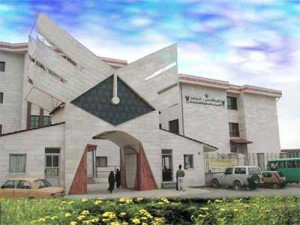Monday
Jul052010
Israel-Turkey Special: How Serious is Ankara's Threat to Cut Relations? (Yenidunya)
 Monday, July 5, 2010 at 10:52
Monday, July 5, 2010 at 10:52  UPDATE 0955 GMT: Reuters and Israeli newspapers have now picked up on the Davutoglu "three options", including the cut-off of Turkish ties with Israel.
UPDATE 0955 GMT: Reuters and Israeli newspapers have now picked up on the Davutoglu "three options", including the cut-off of Turkish ties with Israel.Are relations between Turkey and Israel, after a week of surprising developments, at crisis point? To review....
Last Monday, Israeli media reported that Turkey had not allowed a plane carrying Israeli military officers, en route to a tour of memorial sites in Auschwitz, Poland, to fly over Turkish airspace.
Then Israel's Trade Minister Benjamin Ben Eliezer, with the backing of Israeli Prime Minister Benjamin Netanyahu, had a secret meeting with Turkish Foreign Minister Ahmet Davutoglu. When news of the meeting was leaked by Israeli Foreign Ministry, the Turkish side put the ball in Netanyahu's court and stated that the demand for the discussion came from the Israeli side. The Turkish daily Hurriyet claimed that there were four points made by West Jerusalem:
- Israel is sorry for the tragic deaths.
- According to investigations, there were people linked with Hamas on board. So, it is not possible to pay compensation to these people and their families. Israel can pay to those with no connections.
- Though it understands Turkey's insistence upon an international commission, Israel believes that Turkey should give a chance to its internal enquiry.
- To discuss these matters, Israel wants the diplomatic channels to be opened. Israel is ready to talk.
Returning from a subsequent trip to Kyrgyzstan, Davutoglu said that the Israelis have three options:1) Apologise; 2) Accept an impartial international enquiry and its conclusions; 3) Accept the cutting of diplomatic ties with Ankara.
Denying that President Obama was behind the clandestine meeting last week, Davutoglu stated that Turkey's airspace is entirely closed to Israel's military planes and added:
There is no demand whether this ban should be extended to civilian planes for the time being. It will be considered according to developments. If no steps are taken, Israel's isolation process will continue. We know what we want. Principally, we are right.
The Turkish Defense Ministry informed the Israel Defense Forces over the weekend that it has decided not to participate in a naval search-and-rescue exercise planned for next month. Called Reliant Mermaid, the annual exercise began 10 years ago and included the Israeli, Turkish and American navies. It was even carried out last year after Israel's Operation Cast Lead in Gaza raised tensions with Turkey, although Israel was removed from the Anatolian Eagle air force exercise.
At the end of the day, Turkey is decreasing its military relations with Israel at points where Turkey has no direct interest , such as Israel's use of Turkish airspace and joint military operations, to benefit from the friction over Gaza and the attack on the Freedom Flotilla. However, the limits of this game are also crystal clear.
Obama sent his First Warning to Ankara on Saturday. British Arabic-language daily al-Hayat reported that the US President warned Turkish Prime Minsiter Recep Tayyip Erdogan that the international probe which Turkey has demanded could turn into a "double edged sword", as it could lead to accusations against the passengers on board the Turkish-flagged Mavi Marmara, some of whom were members of the pro-Palestinian IHH organization.




